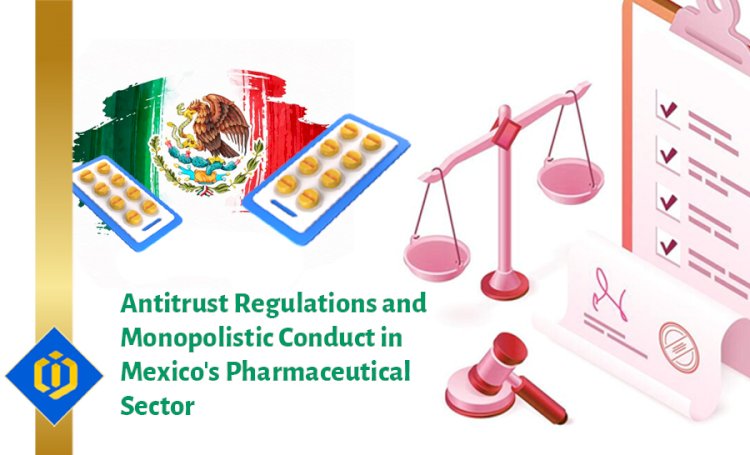Antitrust Regulations and Monopolistic Conduct in Mexico's Pharmaceutical Sector

Introduction:
The pharmaceutical sector plays a crucial role in ensuring public health and well-being. In Mexico, as in many other countries, the industry is subject to antitrust regulations to prevent anti-competitive behavior and promote fair market competition. This article examines the issue of monopolistic conduct within Mexico's pharmaceutical sector, the impact it can have on consumers and competition, and the role of antitrust regulations in addressing these concerns.
Monopolistic Conduct and Its Effects:
Monopolistic conduct refers to the abuse of market power by a single dominant player or a group of colluding firms, leading to anti-competitive practices that harm consumers and restrict market entry for potential competitors. In the pharmaceutical sector, such behavior can manifest in various ways, including price-fixing, predatory pricing, bid-rigging, exclusive dealing agreements, and abuse of intellectual property rights.
The effects of monopolistic conduct in the pharmaceutical sector can be detrimental to consumers and the overall healthcare system. It can lead to inflated drug prices, limited access to affordable medications, reduced innovation, and hindered market entry for generic drugs. These factors contribute to increased healthcare costs and may negatively impact the availability of essential medicines to the general population.
Antitrust Regulations in Mexico:
To address concerns related to monopolistic conduct and promote fair competition, Mexico has established antitrust regulations enforced by the Federal Economic Competition Commission (COFECE). The main legislation governing competition in Mexico is the Federal Economic Competition Law (LFCE). Its objective is to prevent monopolistic practices, protect consumers, and promote economic efficiency.
COFECE has the authority to investigate and penalize companies engaged in anti-competitive behavior, including those in the pharmaceutical sector. The commission is responsible for ensuring fair competition, analyzing market concentration, and promoting the entry of new players to foster a competitive environment.
Case Study: Investigation into the Pharmaceutical Sector:
In recent years, COFECE has conducted investigations into the pharmaceutical sector in Mexico. One notable case involved the investigation of alleged anti-competitive practices by several pharmaceutical companies and associations related to the supply of medications to public healthcare institutions.
The investigation aimed to determine whether there were agreements or concerted practices that restricted competition and resulted in higher drug prices. COFECE found evidence of bid-rigging, price-fixing, and market allocation schemes. As a result, fines were imposed on the companies involved, and corrective measures were implemented to promote fair competition and transparency in the sector.
Promoting Competition and Market Entry:
Antitrust regulations play a vital role in promoting competition and market entry in the pharmaceutical sector. By preventing monopolistic conduct, these regulations create an environment that encourages innovation, ensures reasonable prices, and allows for a diverse range of medication options.
To promote competition, it is essential to address barriers to entry that may hinder the participation of new players in the market. This includes tackling practices such as exclusive dealing agreements, abuse of intellectual property rights, and other tactics that may limit market access for generic drug manufacturers.
Additionally, fostering transparency in pricing and procurement processes can contribute to a more competitive and efficient pharmaceutical sector. By enhancing information availability and facilitating price comparisons, consumers and healthcare institutions can make informed decisions and exert market pressure to encourage fair pricing practices.
Collaboration with International Organizations:
Mexico also collaborates with international organizations to address competition-related concerns in the pharmaceutical sector. For instance, the country is a member of the Organization for Economic Cooperation and Development (OECD) and actively participates in discussions and initiatives related to competition policy.
Through international collaboration, Mexico can learn from best practices and experiences of other countries, further strengthen its antitrust regulations, and improve enforcement mechanisms to tackle monopolistic conduct effectively.
Conclusion:
Antitrust regulations in Mexico's pharmaceutical sector play a crucial role in preventing monopolistic conduct, protecting consumers, and promoting fair competition. By addressing anti-competitive practices such as price-fixing, bid-rigging, and abuse of market power, these regulations aim to ensure reasonable drug prices, encourage innovation, and promote market entry.
COFECE's investigations and enforcement actions demonstrate the commitment of Mexican authorities to address concerns related to monopolistic conduct in the pharmaceutical sector. Through the imposition of penalties and the implementation of corrective measures, the commission strives to create a competitive environment that benefits consumers and the healthcare system as a whole.
Continued efforts to enhance antitrust regulations, foster transparency in pricing and procurement processes, and promote collaboration with international organizations will contribute to a more competitive and efficient pharmaceutical sector in Mexico. Ultimately, these measures aim to ensure affordable access to high-quality medications, encourage innovation, and safeguard the well-being of the population.
Author: Pooyan Ghamari, Swiss Economist & Visionary

 content-team
content-team 






















